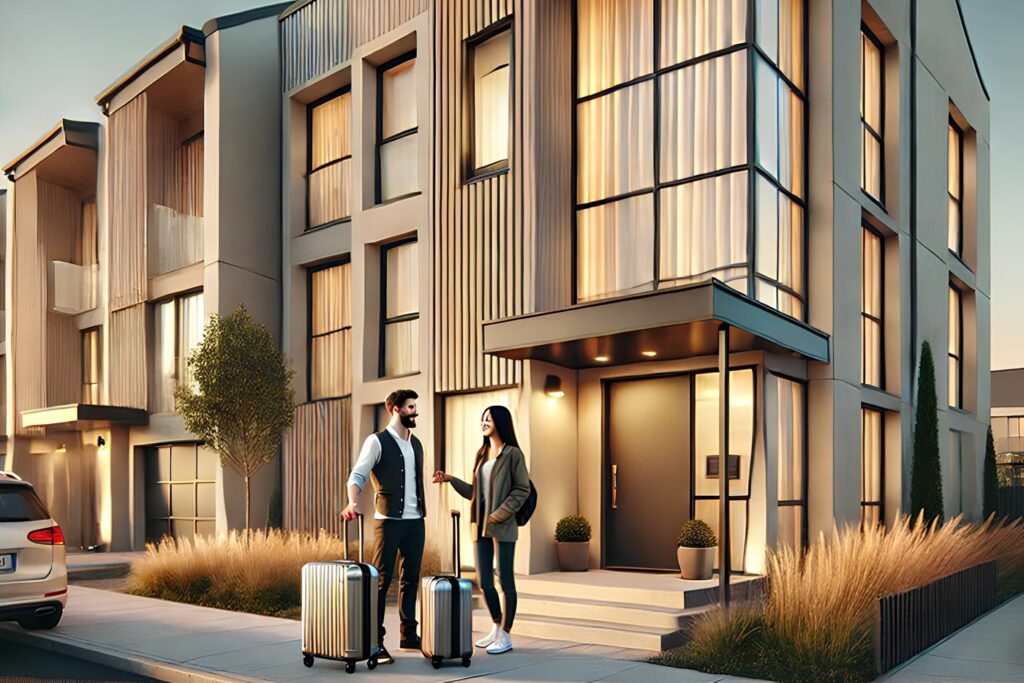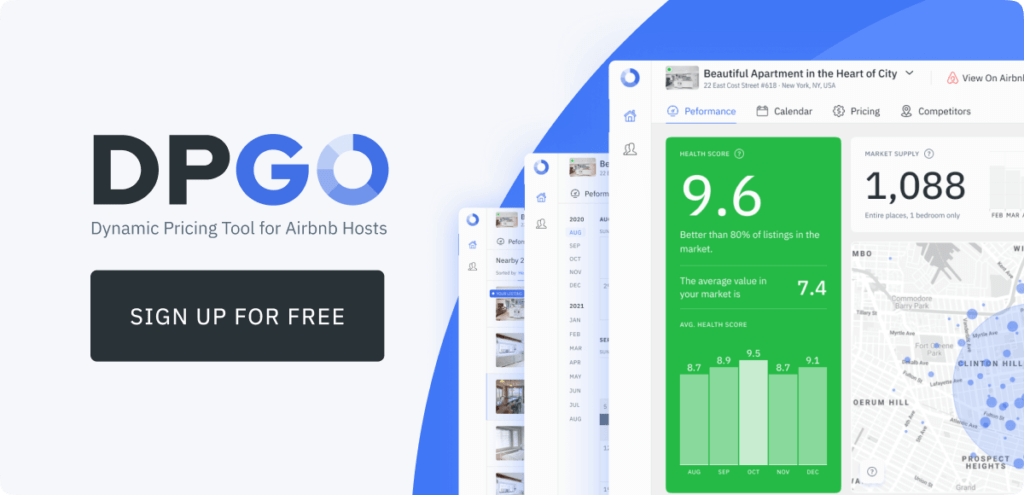Also, Today, more people are investing in Airbnb properties and turning to short-term rentals to earn passive income. As travel demand grows, the right property can deliver strong returns. But success in this space depends on more than just buying any home and listing it online.
Many Airbnb hosts focus on condos or single-family homes. However, townhouses are becoming a popular choice among investors looking for a balance between space, cost, and convenience. They offer unique features that cater to modern traveler preferences, especially in urban and suburban settings.
Townhouses combine comfort, privacy, and affordability in ways that can make them ideal for Airbnb. But as with any real estate investment, they come with both opportunities and risks. This article explores whether a townhouse is a good Airbnb investment in 2025. We’ll cover the main benefits, potential downsides, and the key factors to review before making a purchase.
What Makes a Property a Good Airbnb Investment?
Not all homes are great for short-term rentals. A successful Airbnb investment depends on several core factors that influence guest experience and profitability.
- Location
Properties near popular attractions, public transit, airports, or business centers often perform better. Guests want convenience and easy access to places they care about. Walkability and safety also add value. - Flexibility
Some properties face strict zoning laws or neighborhood restrictions. The fewer hurdles you face when listing and operating, the better your chances of consistent earnings. - Rental demand
Areas with steady tourist activity, business travel, or seasonal events tend to produce higher occupancy rates. Even better if there’s demand year-round instead of just during peak seasons.
Finally, you need strong guest appeal. A good layout, modern design, comfortable furnishings, and thoughtful touches like keyless entry or fast Wi-Fi can make a big difference. Guests consistently choose properties that combine comfort with functionality. If you’re furnishing a townhouse, prioritize:
-
Multiple bedrooms and full bathrooms
-
A well-stocked kitchen with modern appliances
-
High-speed Wi-Fi and a smart TV with streaming apps
-
A private outdoor area (patio, terrace, or balcony)
-
Dedicated workspaces or desks for remote work
Small extras like a coffee maker, blackout curtains, or board games can make your listing stand out—and lead to more 5-star reviews. These details will impact your reviews, your occupancy, and your nightly rate.
When evaluating properties, townhouses often strike a balance. They give more room than condos without the maintenance load of a detached home. Their layout, privacy, and affordability make them a compelling option in many markets.
What Is a Townhouse?
A townhouse is a vertical, multi-floor home that shares one or two walls with its neighbors. Most come with individual entrances, attached garages, and small outdoor spaces like patios or balconies. Owners typically own the entire structure and the land beneath it, unlike condo owners who usually only own the interior space.
These homes are common in both cities and suburbs. They’re often part of a larger development or community, which may include shared amenities like a pool, gym, or green space. Townhouses offer a middle ground between apartment-style living and full-sized detached homes. This makes them attractive to many Airbnb guests. Business travelers enjoy having a private entrance and workspace.
Families appreciate the extra bedrooms and separate floors. Long-term guests value the blend of home comfort with urban convenience. Compared to condos, they offer more privacy and square footage. Compared to single-family homes, they’re often less expensive to buy and maintain. That combination can make townhouses an appealing option for Airbnb investors looking to stand out in crowded markets.
Pros of Townhouse Investment for Airbnb
Townhouses come with several built-in advantages that make them well-suited for Airbnb. They often provide more space than condos, which means more bedrooms, bathrooms, and living areas. This appeals to families, groups, and long-term renters who want comfort and room to spread out. A spacious home also allows for higher occupancy and nightly rates.
Compared to single-family homes, townhouses are usually more affordable, especially in urban areas. Lower purchase prices mean a smaller upfront investment, which can lead to better cash-on-cash returns. Many townhouses are in high-demand locations—close to shopping districts, public transit, and dining areas. These neighborhoods are popular with both leisure and business travelers, which helps drive year-round bookings.
If your townhouse is part of an HOA, exterior maintenance is often handled for you. This includes landscaping, roof upkeep, and sometimes pest control. For busy hosts, that means fewer responsibilities and reduced long-term costs. Guests also enjoy more privacy than they’d get in an apartment. With no upstairs or downstairs neighbors, noise is less of a concern. That creates a more peaceful stay, which can lead to better reviews and repeat bookings.
Finally, many townhouses offer bonus features like attached garages, extra storage, or a second living area. These little extras can give your listing an edge over more basic rentals.
Cons of Townhouse Airbnb Investment
While townhouses offer many benefits, they also come with challenges that Airbnb investors need to weigh carefully. One of the biggest concerns is HOA restrictions. Many townhouses are part of planned communities governed by homeowners associations. These HOAs may prohibit short-term rentals altogether or enforce strict rules, such as guest screening, stay limits, or noise curfews. Even if local laws allow Airbnb, your HOA may not.
Shared walls are another potential issue. Though more private than condos, townhouses still share at least one wall with a neighbor. Guest noise—especially from children, music, or late-night arrivals—can lead to complaints or tension with long-term residents. Outdoor space may also be limited or regulated. Townhouses rarely have large yards, and some patios or balconies fall under HOA jurisdiction. Guests who expect full backyards, barbecue areas, or private pools might be disappointed.
Parking is another concern. In densely built developments, spots can be limited or shared. Some HOAs assign parking or restrict guest vehicles, which can lead to bad reviews if not clearly explained in your listing. Townhouses may offer less flexibility compared to detached homes. You may face restrictions on signage, renovations, or smart home upgrades.
Some communities enforce quiet hours or occupancy caps, which can limit your earning potential. These factors don’t mean you shouldn’t invest—but they do mean you need to research carefully before buying.
What to Consider Before Buying a Townhouse for Airbnb
Before purchasing a townhouse as an Airbnb investment, it’s essential to evaluate several layers of legal, financial, and market-related details.
1. Start by reviewing local short-term rental laws.
Some cities or counties require permits, taxes, or inspections for Airbnb hosts. Others limit how often you can rent or restrict short-term stays in certain zones. These rules change frequently, so double-check with the city planning office or a local real estate expert.
2. Study the HOA rules in detail. Ask for the association’s bylaws and meeting notes.
Look for any language about short-term rentals, guest conduct, or registration. Some HOAs require advance notice before each booking or charge separate fees for short-term use. Make sure you understand the process and costs before committing. Although many HOAs handle exterior upkeep, you’re still fully responsible for maintaining the inside of your unit.
That includes repairs, restocking supplies, and preparing the space between guests. A broken appliance or leaking faucet can lead to bad reviews and cancellations if not handled quickly. To stay ahead, build a maintenance fund and create a network of local handymen and cleaners you can rely on. Efficient response times help protect your reputation and improve guest satisfaction.
3. Analyze the demand for townhouses in your target area.
When scouting for a townhouse, go beyond the tourist hotspots. Look for neighborhoods that attract remote workers, business travelers, and relocating families. Proximity to coworking spaces, public transportation, schools, or medical centers can broaden your guest base.
Use Airbnb analytics tools to track average nightly rates, occupancy, and competition. Compare performance between condos, townhouses, and single-family homes to understand where townhouses fit in the market. Look at guest reviews to see what travelers value most in those areas.
Also, research areas with stable or lenient short-term rental laws. A favorable regulatory environment reduces your risk and makes long-term hosting more viable.
4. Explore financing options.
Some lenders view short-term rentals as higher risk and may offer different loan terms. Be prepared to put down a larger deposit or show stronger financials. It’s also wise to factor in reserves for repairs, vacancy periods, and unexpected expenses.
5. Check your insurance coverage.
A standard homeowner’s policy may not protect you during guest stays. Look for short-term rental policies that include liability coverage, loss of income, and protection against guest damage.
Doing your due diligence upfront can prevent legal troubles, budget issues, or booking delays down the road.
Managing a Townhouse Airbnb: Day-to-Day Operations
Once your listing goes live, how you manage it will directly impact your reviews, occupancy rate, and income. Even the most well-furnished townhouse won’t perform well without consistent attention to detail.
Start by setting up a reliable communication system. Respond promptly to booking inquiries, questions, and guest messages—ideally within an hour. Quick replies not only improve guest satisfaction but also boost your listing’s visibility on Airbnb’s platform.
Make check-in and check-out as seamless as possible. Smart locks or keypad entry systems allow for 24/7 access without the need for in-person meetups. Send guests clear arrival instructions and house rules ahead of time to minimize confusion and reduce the risk of complaints.
After every stay, schedule a full professional cleaning. Don’t just tidy up—restock essentials, inspect for damage, and reset the space to feel fresh and hotel-quality. Consistency builds trust and helps maintain high review scores.
To stay organized, automate where you can. Use platforms like Host Tools to sync calendars across Airbnb, Vrbo, and Booking.com. This prevents double bookings and ensures pricing updates are reflected everywhere. Automation tools can also handle guest messages, review requests, and even custom responses to common questions.
Consider outsourcing repetitive tasks. A virtual assistant or co-host can manage bookings and communication, especially if you’re juggling multiple properties or working full-time. The more efficient your systems, the more scalable your business becomes.
Don’t forget about pricing
Dynamic pricing tools like DPGO adjust your nightly rate based on real-time demand, local events, seasonality, and competitor listings. This helps you stay competitive and maximize revenue without constantly monitoring the calendar.
Conclusion
Townhouses can be an excellent Airbnb investment—but only when the numbers and the regulations align with your goals. Also, they offer the comfort and space guests want, with lower costs and maintenance than many detached homes. Their structure supports family trips, work stays, and long-term rentals, all of which can boost your listing’s performance.
However, townhouses aren’t the right fit for every host or every market. HOAs, local laws, and property limitations can make hosting more complex. That’s why it’s important to treat this as a business decision, not just a personal preference.
Before you move forward, review your local market, study the regulations, and build a clear plan. Think about your ideal guest, the kind of experience you want to provide, and the return you expect. With the right location, strategy, and property, a townhouse can become more than just a home—it can be the foundation of a strong, reliable Airbnb income stream.






Comments are closed.